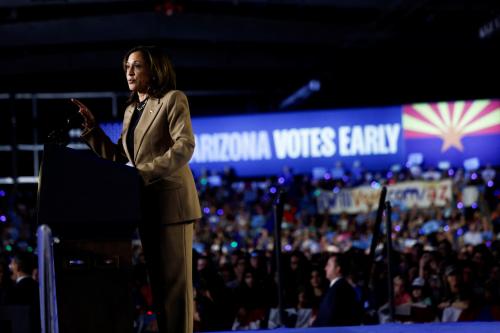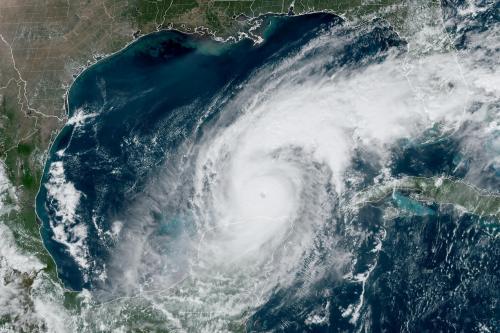Nevada has supported the winning presidential candidates in every election for more than a century with two exceptions—1976 and 2016. Although it has only six electoral votes, in a race this close it could prove to be decisive in November. So here is a snapshot of the state of the 2024 election in Nevada where mail balloting is ongoing, and two weeks of in-person early voting begins on Saturday, October 19.
Before President Joe Biden withdrew, Nevada was trending toward Donald Trump. Vice President Kamala Harris’ ascension to the top of the Democratic ticket moved Nevada back to a toss-up due to increased support among young voters, African Americans, and Latinos.
Still, Harris is facing electoral headwinds owing to Nevada’s high unemployment, record levels of inflation, and dearth of affordable housing. Meanwhile, investments by the Biden administration to support Nevada’s water infrastructure and clean energy economy have failed to resonate with voters who are more concerned with kitchen table issues than climate change or water scarcity.
For Harris to run the Democrats’ winning streak in Nevada to five straight presidential elections, her campaign will have to limit the inroads that Trump is making with minority voters and those without a college degree. Among the swing states, Nevada has by far the smallest share of residents with a bachelor’s degree or higher. The state’s blue-collar economy limits the Democrats’ opportunities to swap out less educated for better educated voters as is occurring elsewhere.
Nevada’s congressional races are shaping up to be less competitive compared to recent cycles. In metro Las Vegas, poor candidate recruitment and weak fundraising are hindering the Republicans’ prospects of flipping the first and fourth districts held by incumbent Democrats Dina Titus and Steven Horsford. The swingy third district held by moderate Democrat Susie Lee is more competitive but leans Democratic. Nevada’s second district comprised of Reno and most of the state’s rural counties has never been carried by a Democrat. This cycle, the Democrats failed to even field a candidate, and instead, incumbent Republican Mark Amodei’s opponent is self-funded nonpartisan Greg Kidd.
Republicans and allied groups have invested heavily in U.S. Senate candidate Sam Brown’s campaign to unseat first-term Democratic incumbent Jacky Rosen. Knocking off an incumbent Nevada senator is a tall task. As exemplified by Harry Reid’s 30-year tenure, Nevada’s U.S. Senate seats have historically been held by its most powerful and longest-serving politicians. Indeed, since the adoption of the 17th amendment ushering in direct election of U.S. senators, just five Nevada incumbent senators who were elected to full terms lost reelection. The most recent was Dean Heller who was defeated by Rosen in 2018 after transforming from a moderate Republican to Trump acolyte.
Rosen is very much in the mold of her predecessors. Ranked as the sixth most bipartisan member, Rosen’s campaign presents her as a nonideological workhorse who is “getting things done for Nevada.” Since Labor Day, Rosen and Democratic groups have enjoyed a two-to-one spending advantage and are poised to dominate the airwaves down the homestretch. The Rosen campaign has used its war chest to define Brown as a MAGA extremist. A 2018 Texas transplant, Brown’s past statements on abortion and tone-deaf opposition to the Biden administration’s $3 billion in funding for the Brightline West high-speed rail line connecting Las Vegas to California’s Inland Empire have provided ample fodder.
Brown also walked back a 2022 statement supporting the storage of nuclear waste at Nevada’s Yucca Mountain. Since the passage of the so-called “Screw Nevada Bill,” Nevadans of all political stripes have opposed federal efforts to develop nuclear storage at Yucca Mountain.1
Brown’s campaign has leaned heavily into his biography. Staples of the campaign’s ads are his military service, entrepreneurship, and family. He has struggled to articulate a cohesive policy message beyond Republican platitudes.
Every public poll has Rosen leading, typically outside the margin of error. Rosen skipped the Democratic National Convention but was quick to endorse Harris in July. The two have appeared together at campaign events. Despite this alignment, as in other swing states where Democratic senatorial candidates are running ahead of Harris, some Nevadans seem to be once again poised to split their tickets by voting for Rosen and Trump. Rosen may also benefit from Trump voters who do not vote the rest of their ballots.
Down ballot, Republican Gov. Joe Lombardo’s political arm is highly engaged in state legislative races in hopes of making inroads into the Democrats’ near veto-proof majorities. Democrats are seeking to secure a supermajority in both chambers by holding their current seats and flipping one of the cycle’s few competitive state Senate seats.
Republican operatives qualified a constitutional amendment requiring photo identification for in-person voting or a driver’s license or Social Security number to vote by mail. For their part, liberal groups qualified a constitutional amendment to protect abortion access until fetal viability. Both measures should pass easily, and both could impact turnout for one or the other presidential candidates.
Nevada’s ballot also features two governance reform measures. One is a legislatively referred referendum to remove Nevada’s elected board of regents from the Nevada constitution and require regular audits of the higher education system. The other would implement open primaries and rank-choice voting for congressional races, state constitutional offices, and state legislative elections.
Nevada requires initiated amendments to win a majority in successive elections. After proponents spent $23 million in 2022, the measure narrowly passed with 52.9% support. Proponents are again spending heavily with messaging focused on the measure’s open primary component while eschewing its ranked choice element. Thus far, beyond a targeted mail campaign by the Nevada Democratic Party, there has been little formal opposition to the measure.
Ultimately, how Nevada goes in 2024 will not be determined by passionate partisans or the millions of dollars being spent on television ads. Instead, close elections in Nevada are won by candidates who can win a majority of votes cast by nonpartisans who now constitute a third of registered voters and expand the voting pool. Despite its swing state status, voter participation in Nevada is below the national average, creating opportunities for both parties to grow the electorate through canvassing and one-on-one voter engagement.
Over the past decade and a half, the Democrats have dominated the ground game thanks in no small part to organized labor, particularly the Culinary Union that has developed a sophisticated field operation that begins in summer and continues through Election Day. The Republicans have a smaller footprint with much of the door-knocking being done by Americans for Prosperity, augmented by volunteer precinct captains and targeted outreach to low-propensity voters, including Latinos and Black men.
While it is an unsettling reality that the least-engaged and informed Nevadans—including some who may not register to vote until Election Day—may cast the deciding votes, the campaigns that best negotiate the vicissitudes of Nevada’s political terrain to nudge recalcitrant voters to the polls will be victorious in November.
-
Footnotes
- In 1996, the state created the Nevada Agency for Nuclear Projects to monitor and coordinate actions related to federal high-level nuclear waste disposal activities. The Nevada Commission on Nuclear Projects was established 11 years before. Chaired by Democrat Richard Bryan, the body was created under his governorship. In 1988, then Gov. Bryan ran for the Senate midway through his second term on a platform fervently opposing Yucca Mountain. In a cycle when George H. W. Bush carried Nevada by more than 20 points, Bryan defeated incumbent Republican Chick Hecht by more than four points.
The Brookings Institution is committed to quality, independence, and impact.
We are supported by a diverse array of funders. In line with our values and policies, each Brookings publication represents the sole views of its author(s).








Commentary
The state of play in the Silver State
October 18, 2024